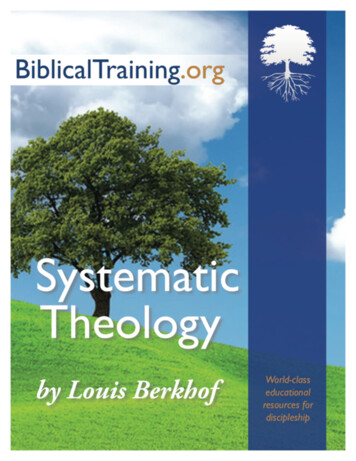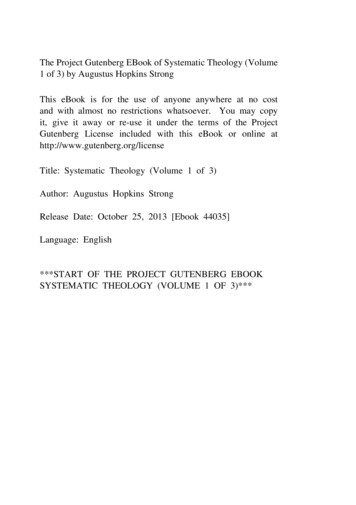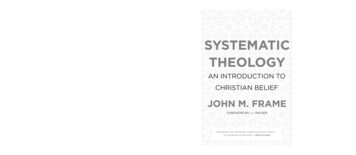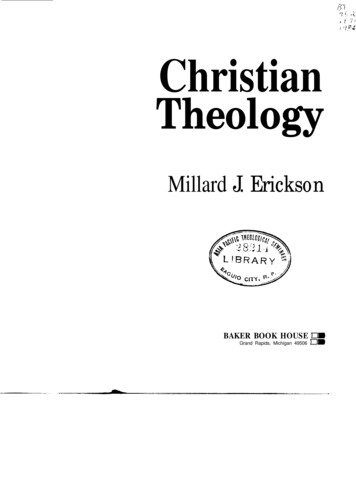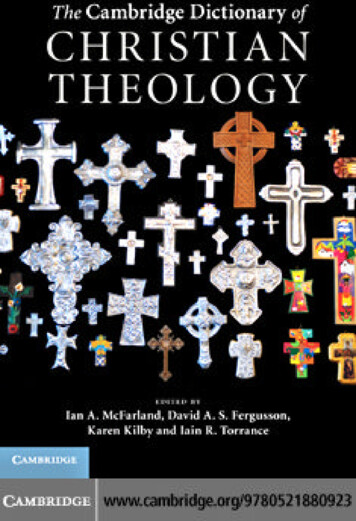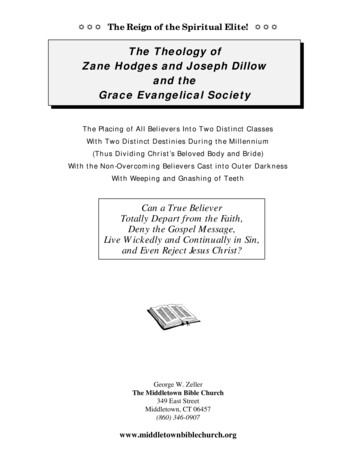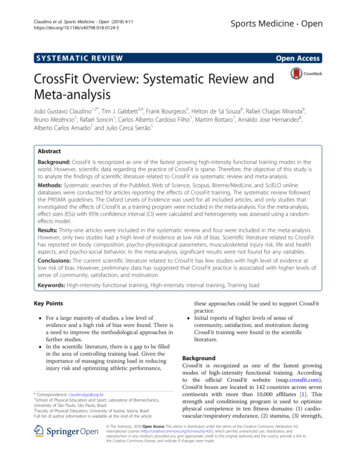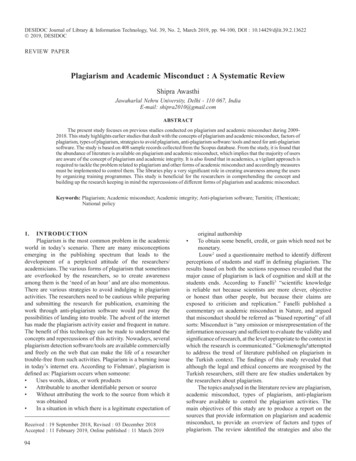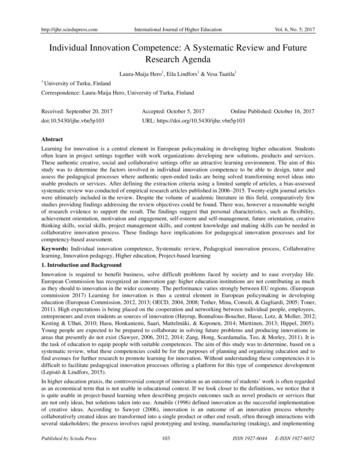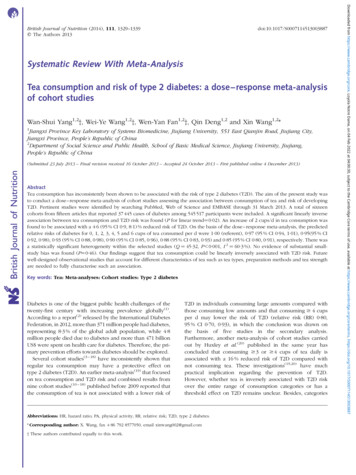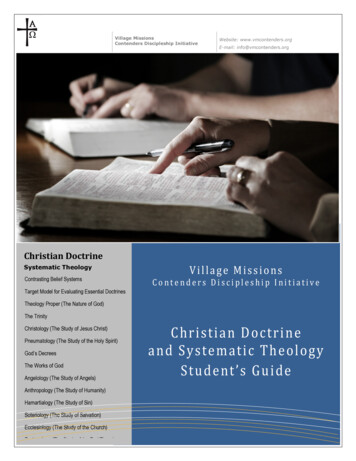
Transcription
Village MissionsContenders Discipleship InitiativeWebsite: www.vmcontenders.orgE-mail: info@vmcontenders.orgChristian DoctrineSystematic TheologyContrasting Belief SystemsVillage MissionsContenders Discipleship InitiativeTarget Model for Evaluating Essential DoctrinesTheology Proper (The Nature of God)The TrinityChristology (The Study of Jesus Christ)Pneumatology (The Study of the Holy Spirit)God’s DecreesThe Works of GodAngelology (The Study of Angels)Anthropology (The Study of Humanity)Hamartialogy (The Study of Sin)Soteriology (The Study of Salvation)Ecclesiology (The Study of the Church)Eschatology (The Study of the End Times)C hri sti a n D oc tri nea nd S y ste m ati c Th e ol og yStu d e nt ’ s Gu i de
Contenders Discipleship Initiative – Doctrine Student’s GuideTRAINING MODULE SUMMARYCourse NameChristian Doctrine & Systematic TheologyCourse Number in Series2Creation DateJanuary 2015Created By:Ken AinsworthLasted Date ModifiedAugust 2018Version Number4.0Copyright note:The Contenders program is provided free of charge and it is expected that those whoreceive freely will in turn give freely. Permission for non-commercial use is herebygranted but re-sale is prohibited.Contenders Bible School was a tuition-free two-year ministry equipping programstarted in 1995 by Pastor Ron Sallee at Machias Community Church, Snohomish, WA.It is now run as a tuition-free online equipping ministry by Village Missions. The fullContenders Discipleship Initiative program with pdf copies of this guide andcorresponding videos can be found at www.vmcontenders.org.Copyright is retained by Village Missions with all rights reserved to protect the integrityof this material and the Village Missions Contenders Discipleship Initiative.Contenders Discipleship Initiative DisclaimerThe views and opinions expressed in the Contenders Discipleship Initiative coursesare those of the instructors and authors and do not necessarily reflect the officialposition of Village Missions. The viewpoints of Village Missions may be found ge Missions may be found at www.villagemissions.org/doctrinal-statementLOCAL INSTRUCTORS using the CDI in a classroom setting are encouraged to fill in any gapsand add to the discussion of content provided by our ONLINE INSTRUCTORS.At times content will be designed to provoke thoughtful discussion of various viewpoints. It is upto the LOCAL INSTRUCTOR to guide discussions in such way that students come to their ownconclusions of what they believe and why they believe it from careful study of the Bible.Student RegistrationYou must register as a student for the CDI to gain access to the video instruction. Youwill find the online registration link at the top of the page at www.vmcontenders.orgYou are encouraged to take these classes under the guidance of a LocalInstructor/mentor. If a Local Instructor/mentor is not available in your area, you arewelcome to take these classes on your own. If you take these courses as anindependent distance learner download and use the Local Instructor guidebook inconjunction with the Student Guidebook as it has additional information.Village Missions 20162Version 4.0
Contenders Discipleship Initiative – Doctrine Student’s GuideTable of ContentsChristian Doctrine & Systematic Theology .6How to Use This Guide .8Student Evaluations .9Recommended Books for this Course . 10Doctrine Course Syllabus . 11Course Goal. 12Course Schedule . 13Video Sessions, Quizzes and Guide Books . 15Session 1, Module 1 - Introduction to Doctrine . 16Review Questions: Introduction to Doctrine. 17Session 1, Part 2 - Where Doctrines Originate . 18Review Questions: Where Doctrines Originate . 20Session 1, Part 3 – The Theistic View of God . 21Review Questions: The Theistic View of God. 23Assignment: Personal Doctrinal Statement . 24Personal Statement of Faith for Ken Ainsworth (Updated Feb 26,2009) . 27Session 2, Part 1 – The Essence and Attributes of God . 29Review Questions: The Essence and Attributes of God. 30Session 2, Part 2 – The Nature of God . 31Review: Essential Doctrines – The Nature of God . 33Session 2, Part 3 – The Trinity . 34Review: Essential Doctrines - The Trinity. 36Session 3: A Little Pop Quiz . 37Session 3, Part 1 – Christology: The Pre-incarnate Christ . 39Review: Essential Doctrines - The Pre-incarnate Christ . 42Session 3, Part 2 – Christology: Nature of the Incarnation . 43Review: Essential Doctrines - Nature of the Incarnation . 46Session 3, Part 3 – Christology: Implications of the Cross. 47Session 3, Part 4 – Christology: Resurrection & Ascension . 48Review: Essential Doctrines - Resurrection & Ascension . 49Session 4, Part 1 – Pneumatology: The Holy Spirit . 49Review: Essential Doctrines - The Holy Spirit. 53Session 4, Part 2 – Pneumatology: Works of the Holy Spirit. 54Review: Essential Doctrines - Works of the Holy Spirit. 56Session 4, Part 3– Pneumatology: The Fruit of the Spirit . 57Review Questions: The Fruit of the Spirit . 59Quiz: Pneumatology . 60Session 5, Part 1 – The Eternal Decrees of God . 61Village Missions 20163Version 4.0
Contenders Discipleship Initiative – Doctrine Student’s GuideReview Questions: The Eternal Decrees of God. 62Session 5, Part 2 –Creation. 63Review Questions: Creation . 65Session 5, Part 3 – Alternative Views of Creation . 66Review: Essential Doctrines - Creation . 68Session 6, Part 1 – Angelology: The Doctrine of Angels . 69Review Questions: Angelology: The Doctrine of Angels . 70Session 6, Part 2 – Angelology: The Role of Angels . 71Review: Essential Doctrines - The Role of Angels . 72Session 6, Part 3 – Angelology: Satan and the Fallen Angels . 73Review: Essential Doctrines - Satan and the Fallen Angels. 75Quiz: Mid-Term. 76Session 7, Part 1 – Anthropology: The Image of God . 85Review Questions: Anthropology: The Image of God. 87Session 7, Part 2 – Anthropology: The Nature of Man. 88Review: Essential Doctrines - The Nature of Man . 90Session 7, Part 3 – Anthropology: The Fall of Man . 91Review: Essential Doctrines - The Fall of Man . 94Session 8, Part 1 – Hamartialogy: The Doctrine of Sin. 95Review Questions: The Doctrine of Sin. 96Session 8, Part 2 – Hamartialogy: The Imputation of Sin . 97Review Questions: The Imputation of Sin . 99Session 8, Part 3 – Hamartialogy: Total Depravity . 100Review: Essential Doctrines – Total Depravity . 102Session 9, Part 1 – Soterialogy: The Elements of Salvation. 103Review: Essential Doctrines - Elements of Salvation. 105Session 9, Part 2 – Soterialogy: The Mechanics of Salvation . 106Review Questions: The Mechanics of Salvation . 108Session 9, Part 3 – Soterialogy: Divine Election . 109Review: Essential Doctrines - Divine Election . 111Session 10, Part 1 – Soterialogy: Regeneration & Justification . 112Review Questions: Regeneration and Justification . 113Session 10, Part 2 – Soterialogy: Sanctification . 114Review Questions: Sanctification . 115Session 10, Part 3 – Soterialogy: Assurance of Salvation. 116Review: Essential Doctrines - Assurance of Salvation . 117Quiz: Soteriology . 118Session 11, Part 1 – Ecclesiology: Doctrine of the Church . 120Review: Essential Doctrines - The Doctrine of the Church . 122Session 11, Part 2 – Ecclesiology: Mission of the Church . 123Village Missions 20164Version 4.0
Contenders Discipleship Initiative – Doctrine Student’s GuideReview Questions: The Mission of the Church . 124Session 11, Part 3 – Ecclesiology: Church Government . 125Review: Essential Doctrines - Church Government . 127Session 11, Part 4 – Ecclesiology: Church Ordinances & Discipline . 128Review: Essential Doctrines - Ordinances & Discipline . 131Session 12, Part 1 – Eschatology: The Doctrine of Hell . 132Review: Essential Doctrines - The Doctrine of Hell . 134Session 12, Part 2 – Eschatology: The Doctrine of Heaven. 135Review: Essential Doctrines – Doctrine of Heaven . 136Session 12, Part 3 – Eschatology: The Second Coming. 137Review: Essential Doctrines - The Second Coming . 140Session 12, Part 4 – Eschatology: The 70 Weeks Prophecy . 141Review Questions: The 70 Weeks Prophecy. 142Session 13, Part 1 – Eschatology: The End According to Jesus . 143Review: Essential Doctrines: The End According to Jesus. 144Session 13, Part 2 – Eschatology: Rapture . 145Review Questions: Rapture . 150Session 13, Part 3 – Eschatology: Resurrection . 151Review: Essential Doctrines - Resurrection . 152Session 13, Part 4 – Eschatology: Divine Judgment . 153Review: Essential Doctrines - Divine Judgment . 155Final Exam: Introduction to Christian Doctrine. 156Glossary. 163Index . 1677Village Missions 20165Version 4.0
Contenders Discipleship Initiative – Doctrine Student’s GuideCHRISTIAN DOCTRINE & SYSTEMATIC THEOLOGYThis is the Second Course in the CDI ProgramThe core CDI courses are:1. Bibliology and How to Study the Bible2. Doctrine3. New Testament4. Old Testament5. Church History6. Evangelism, Teaching and PreachingThis course will help you as Christians know what you believe and why you believe it.While the coursework for the Contenders Discipleship Initiative can be takenindependently by utilizing the online resources, your learning experience will begreatly enhanced when the content is delivered in a classroom setting. This is mostcertainly true for Systematic Theology and Christian Doctrine.This course gives you an overview of major Biblical doctrines, putting them incontext of a systematic theology. While most evangelical Christians agree thatdoctrine should come from the Bible, the reality is that the influences of culture andchurch tradition often undermine the clear teaching of God’s Word.You will learn to evaluate various doctrinal viewpoints from Scripture and determinewhich doctrines are absolutely essential to the Christian faith. At the end of thecourse, you will produce your own statement of faith comprised of those doctrinesfor which you would be willing to die.One of the greatest challenges is to distinguish between Biblically essential doctrinalviewpoints and those for which Christians might agree to disagree. This course usesthe “target model” to facilitate making these distinctions.Village Missions 20166Version 4.0
Contenders Discipleship Initiative – Doctrine Student’s GuideAt the end of each video session, you will be challenged to consider which conceptsare absolutely essential to the Christian faith. These “bulls-eye” doctrines are thosewhich are clearly taught in the Bible and should be part of every Christian’s personalstatement of faith.There is no required textbook for this course. However, Lectures in SystematicTheology by Henry Thiessen is highly recommended. Thiessen presents systematictheology from a dispensational viewpoint. Because I, [Ken Ainsworth, your videoinstructor], tend to gravitate more toward a covenant theology, Thiessen’s work willserve to broaden the perspective.Suggested reading assignments from this textbook are included in the courseschedule.I’ve been privileged to teach this course a number of times over the years. Eachquarter, I develop wonderful relationships with my students, several of whom havegone on to full-time pastoral ministry. Their questions challenge me to continue tosearch the Scriptures to find out whether these things are so Acts 17:11. I believeI’ve been able to challenge them in similar ways. My prayer for you is that you wouldhave a similar experience. The study of Biblical doctrine is a life-long enterprise thatfuels Christian growth and sanctification. May you have the incredibly rewardingexperience of assisting others along that path.Ken Ainsworth, July, 2014Village Missions 20167Version 4.0
Contenders Discipleship Initiative – Doctrine Student’s GuideHOW TO USE THIS GUIDEThis student’s guide is used in conjunction with the online video course developed forChristian Doctrine and Systematic Theology.As a first step, you must register prior to taking this course. Registration is found atwww.vmcontenders.org/register.htmlThis guide is designed to be used as you attend either a pastor-led or self-studysession of this course. This guide can help you in three ways:1. Follow along with the video and take notes. Space is provided in the guide totake notes as you work through the sessions.2. Utilize worksheets: The student’s guide includes activity worksheets whichallow you to apply what you have learned. If you are going through this course asa self-study session, you may also want to download the Instructor’s guide aswell. The Instructor’s guide has extra notes filled in as well as instructions to thepastors on how to conduct an assignment. Also, in the Instructor’s guide, ateacher’s copy of each worksheet, including answers and hints, follows theworksheet.3. Assess progress: Finally, this guide includes a final assessment that you cantake to test your knowledge.How the guide is organized.This guide is broken into sessions that follow along with the course videos. Also inthis guide are learning objectives, reviews, quizzes and a glossary of terms. Thecurriculum is designed to be presented in Module and Session sequence.Each module also uses the following icons:IconMeaningGroup Activity These assignments will be conducted in class. For thosedistance learners, instructions are in your guide on how to complete theseactivities. It is highly recommended that distance learners completethese activities.AssignmentsAssignments for the class including outside reading.Exam All exams are open book.Key PointVillage Missions 2016A specific item to remember.8Version 4.0
Contenders Discipleship Initiative – Doctrine Student’s GuideSpecial NoteChristian Doctrine and Systematic Theology was recorded at Contenders Bible Schoolof Machias Community Church.These sessions, as presented in the Contenders Discipleship Initiative, have beenbroken into smaller segments for pastor/mentor-led classes as well as independentdistance learners.Pastor Ken's Student Guide has since been updated to match the structure of thevideo course as presented in the CDI and is available as the Student Guide on theCDI website.If you have any feedback for CDI concerning the videos or this guide, please feel freeto report them at www.vmcontenders.org/feedback.html. We look forward tohearing from you.STUDENT EVALUATIONSContenders Discipleship Initiative uses a narrative evaluation approach rather thanissuing grades during a student’s course of study. An online form is completed aftereach course that indicates what a student has learned.The complete Contenders Discipleship Initiative Narrative Evaluation consists of twowritten evaluations for each course: one from the Local Instructor for each studentattending a course and one from the student giving a self-assessment.Students who subsequently apply to Village Missions will need to have theseevaluations recorded in the CDI Learning Management System for each course.The online Local Instructor’s Student Evaluation can be found at:vmcontenders.org/pastor assessment.htmlThe Student Self Evaluation form can be found at:vmcontenders.org/student assessment.htmlThe student’s Self Evaluation summarizes your accomplishments while taking thecourse, any new understandings achieved, and the your goals for the future.Village Missions 20169Version 4.0
Contenders Discipleship Initiative – Doctrine Student’s GuideRECOMMENDED BOOKS FOR THIS COURSETextbook for this course:Lectures in Systematic Theology by Henry Thiessen.978-0802827296 25.00Other recommended text books include:Charts of Christian Theology & Doctrine by H. Wayne House978-0310416616 14.00The Kingdom of the Cults by Walter Martin.978-0764228216 20.00Great Doctrines of the Bible by D. Martyn Lloyd-Jones978-1433538797 27.00Village Missions 201610Version 4.0
Contenders Discipleship Initiative – Doctrine Student’s GuideDOCTRINE COURSE SYLLABUSUpon completing this course you will have a solid foundation for further study andwill be able to identify aberrant teachings and heresy.Subjects Covered:Contrasting Belief SystemsThe Target Model for Evaluating Essential DoctrinesTheology Proper (The nature of God)The TrinityChristology (The study of Jesus Christ)Pneumatology (The study of the Holy Spirit)God’s DecreesThe Works of GodAngelology (The study of angels)Anthropology (The study of humanity)Hamartiology (The study of sin)Soteriology (The study of salvation)Ecclesiology (The study of the church)Eschatology (The study of the end times)Classroom Sessions Will Involve:LecturesClass DiscussionStudent to Student CollaborationQuizzes and Major Examinations (2)Outside Assignments to Include but Not Limited To:Outside readingCompletion of student’s statement of faith, supported by ScriptureVillage Missions 201611Version 4.0
Contenders Discipleship Initiative – Doctrine Student’s GuideCOURSE GOALThis course gives students an overview of major Biblical doctrines, putting them incontext of a systematic theology.Theology is the study of God and how He relates to His universe through Hissovereign will, His decrees and His works.Systematic theology provides a framework for organizing the findings of theology.Theology is comprised of doctrines, which are teachings about God and His creation.The exclusive source for evaluating the veracity of doctrine must be God’s specialrevelation which we have preserved in our Bible.All Scripture is given by inspiration of God, and is profitable for doctrine, forreproof, for correction, for instruction in righteousness, that the man of Godmay be complete, thoroughly equipped for every good work.2 Timothy 3:16-17While most evangelical Christians agree that doctrine should come from the Bible,the reality is that the influences of culture and church tradition often undermine theclear teaching of God’s word. Students in this course will learn to evaluate variousdoctrinal viewpoints from scripture and determine which doctrines are absolutelyessential to the Christian faith. At the end of the course, students will produce theirown statement of faith comprised of those doctrines for which they would be willingto die.It is highly recommended that you have first completed Bibliology and How toStudy the Bible as the skills gained in that foundational course are invaluable fordetermining and evaluating Biblical doctrine.Upon completing this course you will have a solid foundation for further study andwill be able to identify aberrant teachings and heresy.Village Missions 201612Version 4.0
Contenders Discipleship Initiative – Doctrine Student’s GuideCOURSE SCHEDULESystematic Theology and Christian DoctrineFill dates and times per the schedule given to you by your pastor/mentor iftaking this as an instructor-led course.DateTopic(s)Assignments and OptionalReadingsSession 1 Part 1: IntroductionRead Genesis 1Date: Part 2: Where DoctrinesOriginateRead Hebrews 11-12 Part 3: Conflicting Views ofGodSession 2Recommended Reading: Thiessen: pp. 1-71Doctrinal Draft QuestionnaireAssigned Part 1: The Essence andAttributes of God Part 2: The Nature of God Part 3: The TrinitySession 3 Quiz #1Date: Part 1: The PreincarnateChrist Part 2: The Nature of theIncarnationSession 3(cont.) Part 3: Implications of theCrossDate: Part 4: Resurrection andAscensionSession 4 Quiz #2Date: Part 1: Pneumatology Part 2: Works of the Spirit Part 3: Fruit of the SpiritSession 5 Part 1: Eternal Decrees of GodRead Genesis 3Date: Part 2: CreationRead Romans 1 -3:20 Part 3: Alternative views ofCreationRecommended Reading:Recommended Reading:Date:Recommended Reading: Thiessen: pp. 75-99Recommended Reading: Thiessen: pp. 206-228Recommended Reading: Thiessen: 229-250Recommended Reading:Session 6 Part 1: The Doctrine of AngelsDate: Part 2: The Role of Angels Part 3: Satan & the FallenAngelsVillage Missions 2016Doctrinal Draft Due13 Thiessen: 251-256Thiessen: 100-129Thiessen: 131-148Version 4.0
Contenders Discipleship Initiative – Doctrine Student’s GuideDateTopic(s)Assignments and OptionalReadingsDate: Recommended Reading:Mid-Term Exam Thiessen: 149-167Session 7 Part 1: AnthropologyDate: Part 2: The Nature of Man Part 3: The Fall of ManSession 8 Part 1: The Doctrine of SinDate: Part 2: The Imputation of Sin Part 3: Total DepravitySession 9 Part 1: Elements of SalvationDate: Part 2: Mechanics of Salvation Part 3: Election &Predestination Part 1: Regeneration &Justification Part 2: Sanctification Part 3: Assurance of SalvationSession 11 Quiz #3Date: Part 1: Ecclesiology Part 2: The Mission of theChurchSession 11(Cont.) Part 3: Church Organization &GovernmentDate: Part 4: Church Ordinancesand DisciplineSession 12 Part 1: The Doctrine of HellRecommended Reading:Date: Part 2: The Doctrine ofHeavenThiessen: 337-353Session 12(Cont.) Part 3: The Doctrine of theEndRecommended Reading:Date: Part 4: The 70 WeeksProphecySession 10Date:Village Missions 2016Recommended Reading: Thiessen: 168-184Recommended Reading: Thiessen: 185-195Recommended Reading: Thiessen: 199-205; 257274Recommended Reading: Thiessen: 275-305Recommended Reading:14 Thiessen: 309-322Recommended Reading: Thiessen: 323-334Thiessen: 355-379Version 4.0
Contenders Discipleship Initiative – Doctrine Student’s GuideDateTopic(s)Assignments and OptionalReadingsSession 13: Part 1: The End According toJesusRecommended Reading: Part 2: Rapture DoctrineSession 13(Cont.)Date: Part 3: Resurrection Part 4: Divine JudgmentDate: Final ExamDate: Bibliography Final EvaluationsDate: Thiessen: 380-394Recommended Reading: Thiessen: 395-403Personal Doctrine StatementDue.VIDEO SESSIONS, QUIZZES AND GUIDE BOOKSThe notes in the guides for each video session are designed to focus your attentionon the most important points.It is recommended that you to read through the notes before starting thecorresponding video. This will allow give you a chance to look for the missing wordsas the video progresses.At the end of most note guides, there will either be a short set of review questions,or a table entitled Essential Doctrines. These should be completed before movingon to the next video.Exams and QuizzesAll exams and quizzes are open book, open note and open Bible. They are designedfor review and for reinforcing key concepts. They are not primarily intended forevaluation. They should be assigned as take-home tests. The following session canthen be used to evaluate (“grade”) your own tests.Village Missions 201615Version 4.0
Contenders Discipleship Initiative – Doctrine Student’s GuideSESSION 1, MODULE 1 - INTRODUCTION TO DOCTRINEAt the end of this lesson, you will:Know the scope and sequence of the course.Define and contrast the terms “Doctrine” and “Systematic Theology”The word “doctrine” is found in the Bible and means , ,.And they continued steadfastly in the apostles' doctrine and fellowship, inthe breaking of bread, and in prayers.Acts 2:42All Scripture is given by inspiration of God, and is profitable for doctrine, forreproof, for correction, for instruction in righteousness, that the man of Godmay be complete, thoroughly equipped for every good work.2 Timothy 3:16-17The study of God and how He relates to His universe is called.Theology, in contrast, is not a word we find by itself in the Bible.It is derived from two Greek words: The first is Theos, which means God. The secondis logos, which literally means “word,” but it is far more than just a word spoken orwritten on a page. It carries the idea of the totality of everything there is to knowabout a subject.Question:How would you relate the two terms “doctrine” and “theology” to one another?When we put everything we know about God into an organized framework, we havea .Village Missions 201616Version 4.0
Contenders Discipleship Initiative – Doctrine Student’s GuideStart thinking about your personal statement of faith. It is to be a series ofconcise statements of what you believe regarding your Christian faith, supported byapplicable scripture. As we begin to investigate the nature of God, you will want tostart drafting your statement. As you learn more, you will add to the document, andperhaps modify the document to more closely conform to what is taught in the Bible.More information about this assignment to follow in Session 1, Part 3.REVIEW QUESTIONS: INTRODUCTION TO DOCTRINE1. What is the relationship between
theology from a dispensational viewpoint. Because I, [Ken Ainsworth, your video instructor], tend to gravitate more toward a covenant theology, Thiessen’s work will serve to broaden t

